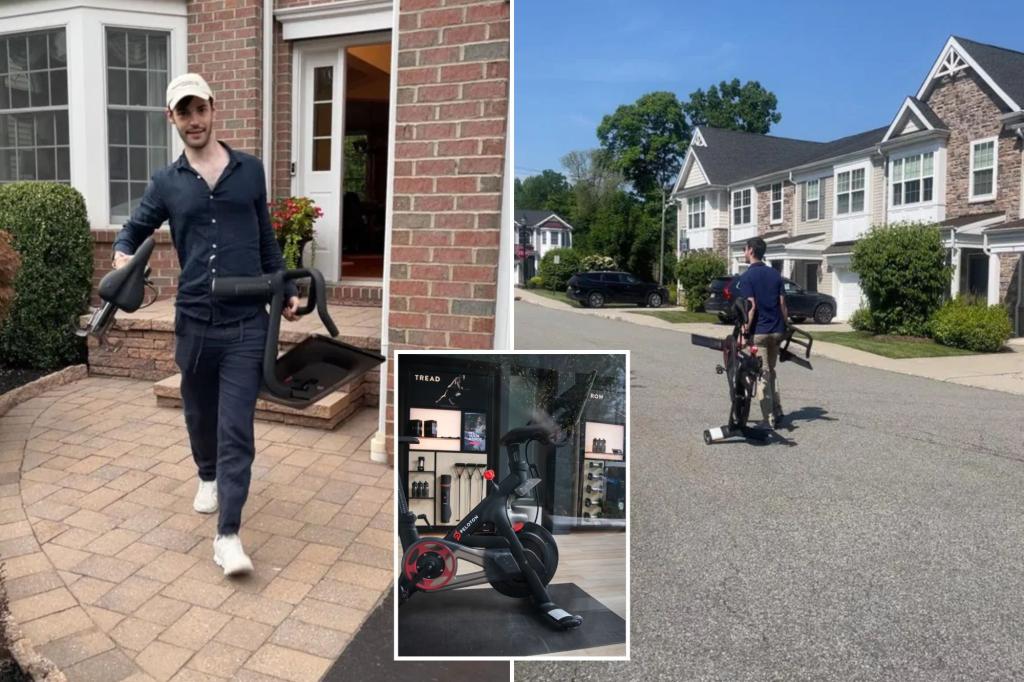A New York City-based startup is buying up used Pelotons that have been gathering dust since the pandemic and reselling the once-prized bikes at premium prices, The Washington Post has learned.
Trade My Spin, launched in March by City University of New York graduate Ari Kimmelfeld, hopes to attract new customers and spur interest in the struggling exercise-bike maker by making pricey Peloton bikes available for a cheaper price.
Kimmelfield buys unused bikes for as little as $200 from people who simply want to get rid of bulky bikes from their homes by filling out a form on the company’s website.
Ari Kimmelfeld, co-founder of Trade My Spin, has been peddling dusty used Peloton bikes since the pandemic ended.
“These are really high-end clothing racks,” Kimmelfeld told The Post.
Trade My Spin resells Pelotons for $500 to $700, a relative bargain compared to the $1,200 to $3,000 prices for a new bike.
Kimmelfeld said the company has sold about 2,000 bikes in the past four months.
Most of the profits come from selling accessories such as Peloton shoes, mats and bike weights, as well as extended warranties.
Shoes might sell for $79 a pair new instead of $125, and mats might sell for $49 new instead of $75, Kimmelfeld said.
He argued that there is still room for growth in the business.
About 25% of the 4.5 million Peloton bikes and treadmills built since 2019 are sitting idle, according to Trade My Spin research. The company is capitalizing on excess inventory that has forced the ouster of two Peloton CEOs and caused its stock price to plummet 97% over the past three years.
Five-month-old startup buys and sells used Peloton equipment at deep discounts. Trade My Spin
The highest price was $167.42 on January 31, 2021 and closed at $3.65 on July 29, 2024.
“While Peloton’s business and stock price overall are not doing as well, the underlying business is much stronger — it’s just not reflected in the financials,” said Kimmelfeld, who grew up in Brooklyn and earned degrees from Baruch College and Macaulay Honors College of the City University of New York.
“When we calculated how many Peloton bikes were sitting idle, we thought there might be an opportunity to recycle the bikes and get them into the Peloton ecosystem at a lower price.”
Meanwhile, Peloton is benefiting from attracting new customers who sign up for a $44-a-month subscription to its online classes.
Demand for Peloton’s exercise equipment surged and then crashed during the pandemic, leaving the market overcrowded with bikes. Bloomberg via Getty Images
But the company disputed Trade My Spin’s analysis of its numbers, which are based on public data the company provides about its number of paying subscribers (3 million) and sales data, Kimmelfeld said.
“While Peloton values entrepreneurial spirit and innovation, the data provided by Trade My Spin is not accurate. We are unable to provide further details about our sales figures,” the company said in a statement.
Peloton sells its own refurbished equipment, and says the used market has been “steadily growing.” The growth has been so high, the company said, that it recently launched a “history summary” for each bike it’s ever sold, including “the approximate number of previous workouts, first boot date, service visit history, and number of previous owners.”
The Peloton Bike requires a mat, weights, and special spinning shoes, which are also sold by Trade My Spin. Getty Images
That hasn’t stopped other resellers on Facebook Market, Craigslist and Trade My Spin from trying to cash in on the pandemic craze as customers snap up Pelotons like candy and then abandon them once COVID subsides.
Kimmelfeld said his own difficult experience trying to buy a Peloton bike during the COVID-19 pandemic inspired him to start Trade My Spin.
“There are a lot of problems that have to be solved, like getting a 130-pound bike down three flights of stairs and into a taxi,” Kimmelfeld said.
He founded the company with Joey Benjamini, an automotive entrepreneur who runs Philadelphia-based Collectible Classics, an online seller of used luxury cars including Aston Martins, Corvettes and Jaguars.
Joey Benjamini, founder of the luxury online car site, is also co-founder of Trade My Spin.
The founders, who are in their 20s, were introduced by Kimmelfeld’s wife, a Philadelphia native, to raise private equity for their business.
Kimmelfeld declined to say how much has been invested in the company.
Benjamini heads the startup’s logistics division, which contracts with truck drivers to pick up Pelotons from customers’ homes in major cities like New York, Boston, Dallas and Chicago and deliver them to new owners.
Most of the bikes have low mileage, fewer than 150 trips, Kimmelfeld said.
Ari Kimmelfeld, co-founder of Trade My Spin, delivers used bikes to customers’ homes and assembles and installs the equipment.
The logistics of recovering all that heavy equipment led Peloton to recall 2.2 million seatposts that came with its original bikes last year, ending a brief promotion for Peloton competitor Echelon.
Echelon offered to recall the defective equipment and provide customers with credit toward purchasing Echelon bicycles.
“Every time Peloton did a major recall over broken seat posts, we had hundreds of applicants, but we stopped because it was a logistical nightmare,” Echelon Chief Executive Lou Lenting told the Post.

